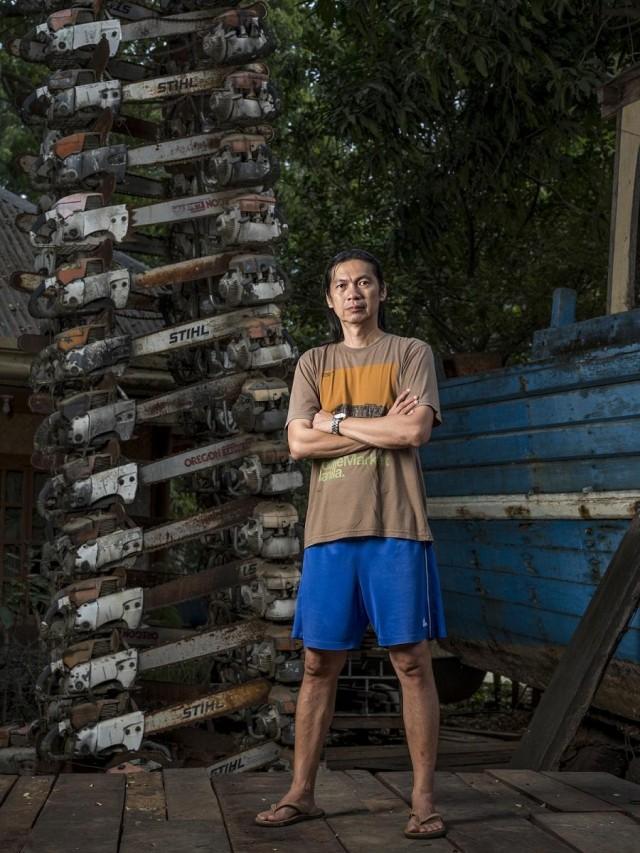'Delikado': The hidden war in Palawan's forests
A growing number of beach lovers around the world adore the bucket-list El Nido, the island jewels of northern Palawan, with its commanding limestone cliffs and secluded turquoise lagoons.
What is hardly known is its dark and dangerous underbelly, the thick forests of the interior where tourists dare not go but where human termites with chainsaws have long been hard at work cutting and poaching what should be protected hardwood trees.
The internationally acclaimed documentary film “Delikado” blows the lid open on this rapid ruin of ancient forest and the almost suicidal risks taken by the handful of men depicted trying to save it.
In the opening scene, and in the dramatic trailer, we see these unarmed non-government “land defenders” gingerly approach an iIlegal logging site inside a jungle and make citizen arrests while confiscating a chainsaw, adding to a tower of impounded chainsaws back at their headquarters.
It becomes clear that the loggers are mere laborers driven by poverty to commit ecological crimes. What was unclear until the end was whom they were working for and where the contraband logs were headed.
That was just one of several unconnected dots of accountability in this pre-pandemic production. Were the small-scale loggers contracted by a local financier or a bigwig politician in the capital? And was the wood intended for a simple cottage in Palawan’s hinterlands or for the maker of fine furniture in Luzon? Some conspicuous lids remain closed.
The heroes of the film are this small band of forest saviors and their leader, Bobby Chan, the office-bound lawyer and executive director of the civil society group Palawan NGO Network, Inc., or PNNI. He is repeatedly shown emotionally torn by the risks his colleagues face whenever they leave him behind in the city.
While the conflicted Chan is the brain providing legal cover for unorthodox tactics, the jungle smarts belong to their compelling field commander, Tata Balladares, the former soldier and logger turned avenging eco-warrior.
Early in the film, one of the PNNI “para enforcers,” Ruben Arzaga, speaks earnestly to an unseen interviewer about their quixotic mission. Some moments later, as he and others undertake another perilous operation in the jungles of El Nido, gunshots are heard. The next scene shows Ruben’s family crying over his body in a coffin, which is then carried in a procession on one of Palawan’s picturesque beaches. The motive behind the murder is strongly implied but viewers never find out exactly how he was killed or who could have done it.

Bobby Chan is wracked by guilt. But they need to keep raiding logging sites at great risk because “no one else will.”
The question is why. Parallel to the narrative of the land defenders’ courage is the sympathetic portrait of El Nido’s youthful mayor, Nieves Rosento, who in the film is campaigning for re-election in 2019 on an environmental platform. But it was never shown, and she wasn’t asked, how she was using the resources of her office to reinforce Bobby Chan and his shoestring operation. One assumes that local taxes from El Nido’s flourishing tourism could fund a few forest rangers, especially if the mayor prides herself on being a fellow crusader for the forests. As Chan seethes, “this is government’s job.”
Yet to illustrate the dangers facing land defenders everywhere, another wake is shown, this time of a government forest ranger presumably killed in the line of duty, and presumably outside El Nido where Bobby Chan’s group strives to fill a vacuum of protection.
Surely, government is doing far from enough to defend the environment. But Palawan, the nation’s largest province in land area, is actually considered a pioneer in environmental protection in the Philippines. A commercial log ban was imposed there in 1992, long before other provinces, canceling some of the biggest timber concessions in the country. A unique government body, the Palawan Council for Sustainable Development, was created by law and empowered to regulate the use of natural resources in the province. Despite the illegal logging, it would have been enlightening for the film to show satellite images of forested areas in Palawan and how these changed since the commercial log ban in 1992.
Even larger threats today probably come from commercial mining and land development, including the tourism boom that El Nido is spearheading, as “Delikado” also makes clear. Both mining and resorts often require land clearing and tree-felling as well. The governor, Jose Alvarez, is portrayed in the film as a major landowner in the province, with one tribal member claiming to have been threatened to force them to sell their land. Alvarez refused to be interviewed for the film, which was produced by an international team led by Australian journalist Karl Malakunas.
But El Nido’s new mayor, Edna Lim, who defeated the film’s heroine Nieves Rosento in the election, gamely faced the camera and vowed to be pro-business while dancing around the issue of vote-buying.
All these developments do not bode well for Palawan’s environment, the nation’s famed “last frontier.” One thing it has in its favor is this film, currently making the rounds of international film festivals. Its exquisite aerial cinematography of Palawan’s lush but pockmarked forests should inspire more gung-ho activism, while shining a new spotlight on the dangers of defending the land. The film’s local impact however is stymied by limited screenings and its absence online. It hasn’t even been shown in Palawan. When asked why, one of the producers at a private screening replied, “delikado.”
—MGP, GMA News




